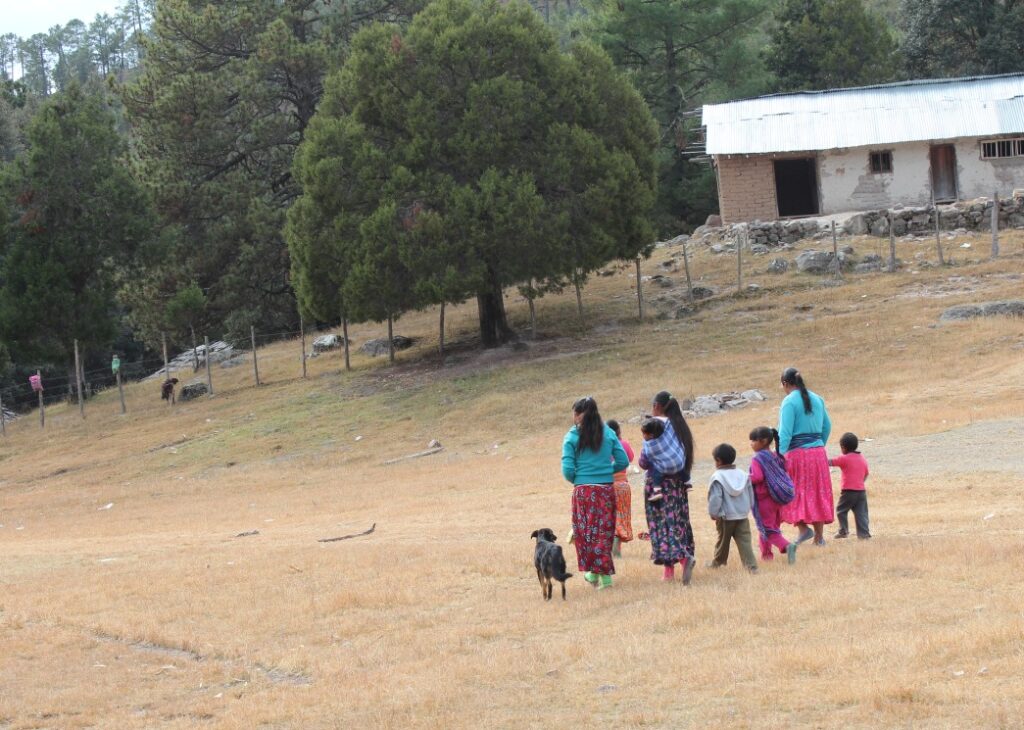- Choréachi is a Rarámuri community in the state of Chihuahua, Mexico with no legal recognition from the State regarding the ownership of their ancestral territory.
- A group of mestizos from the neighboring community seeks to control the area by generating systematic violence consisting of homicides, threats with firearms, arson, cattle theft, rape of women, forced displacement, among others.
- Mexican authorities have been aware of the problem since 2013, and since March 2017, there has been a Resolution from the Inter-American Court of Human Rights (I/A Court H.R.) to implement protection measures for the community, but to date it has not been adequately implemented.
Chihuahua, Mexico, June 11, 2021.- The Public Hearing on the provisional measures granted in favor of the Indigenous Community of Choréachi with respect to Mexico was held today before the I/A Court H.R. The court heard the testimonies of members of the community and beneficiaries of the measures granted.
Despite the fact that the dispute over the territory began in 1969, since the end of 2013 the violence suffered by the community has increased exponentially, which was denounced to the corresponding authorities. Given the lack of response, in 2014 they turned for the first time to the Inter-American Commission on Human Rights (IACHR) to expose the situation experienced by the Rarámuri community of Choréachi as a result of their legitimate defense of territory and natural resources; the Commission required the Mexican State to adopt the necessary measures to guarantee the safety of the people who were leading the collective complaints. These measures were never applied; on the contrary, the risk situation increased and the measures were extended to all indigenous persons in the community.
For 50 years, the Rarámuri community has defended its territory, facing systematic aggressions. Currently, the recognition of their property is pending a ruling from the Supreme Court of Justice of the Nation.
In February 2017, following the murder of Juan Ontiveros Ramos, an indigenous defender of territory and the environment, and given the ineffectiveness of the Mexican State in adopting sufficient measures, the organizations that accompany the beneficiaries requested that the I/A Court H.R. be called upon to address the matter; the latter resolved to grant precautionary measures to the community of Choréachi, which have yet to be applied, even after a second resolution issued in June 2020.
In the hearing held today, the Inter-American Court directly supervised the situation of non-compliance with the ordered protection measures. The indigenous community of Choréachi is a reflection of what many indigenous communities live in our country for whom the legitimate defense of their land, territory and natural resources has a very high price; on many occasions, these communities find themselves isolated while they confront caciques or members of organized crime in their territory, in the face of the indifference of the Mexican State.
The result of this hearing may represent a before and after in actions by the government to guarantee the security of the indigenous communities, although, in the case of Choréachi, social development actions have been implemented, these are insufficient to combat the isolation of the community, the main cause of impunity in the area, and these measures correspond to rights that the State must guarantee and do not respond to a reinforced obligation of the Court to protect them.
During the hearing, with the participation of the representatives of the Mexican State, it was clear the inability or disinterest of deepeningly addressing the problems of the community; there were talks about health and education programs, while the guarantee of security and justice remains uncertain.
In addition, the accompanying organizations mentioned the high cost for the community to defend their territory and the consequences they have had to pay. It was pointed out that the State’s participation is focused on violated rights of the community, but does not resolve the security situation. The representation has insisted on the lack of the serious and urgent response that the case deserves.
It was pointed out that there has been practically no progress in the application of the measures previously ordered by the I/A Court H.R. and the IACHR. There is no progress in the investigation of the human rights violations denounced and the federation has not been able to join this effort. Not even the Court’s resolutions have generated reactions that indicate a willingness to take decisive action to solve this situation.
The beneficiaries, for their part, stated regarding the problems that exist in Choreachi: «we cannot practice our traditional activities because we are discriminated against and persecuted in our own land by foreign people, mestizo people, in our territory; we do not have a document, we do not have anything to prove that we are the owners of our territory. What we want is for Choréachi to be as it was before, for strangers not to enter the community and for the community to be recognized in order to live without violence and persecution, for our human rights as indigenous people to be respected.»
«We do not live at ease in our own lands, we feel fear, the mestizo people have taken away our tranquility.’ We are looking for an answer to the complaints we have filed for years! They have dispossessed us when the only thing we do is take care of the forest; we want respect for the collective rights of the Rarámuri community of Choréachi.»
The IACHR reiterated the need to take measures with cultural belonging and recalled the long road the community has traveled since 2013 to date to reach this point. The Commission recognizes the need for the State to become involved in a coordinated manner in the planning, implementation and monitoring of security measures, as well as in the progress of the investigation into the acts of violence committed against the community; the Court was asked to rule on the implementation of the provisional measures.
The organizations that accompany and legally represent the community: Alianza Sierra Madre (ASMAC) and the Women’s Human Rights Center (CEDEHM), we hope that the recognition of the situation of insecurity that the Rarámuri community is experiencing will allow us to address the need to provide full conditions for the defense of the territory, as well as the importance of the recognition of belonging to the communities, that this hearing can direct the work of the State to carry out real and forceful actions for the benefit of those who defend the territory and the environment.
You can find this hearing at: http://www.corteidh.or.cr



